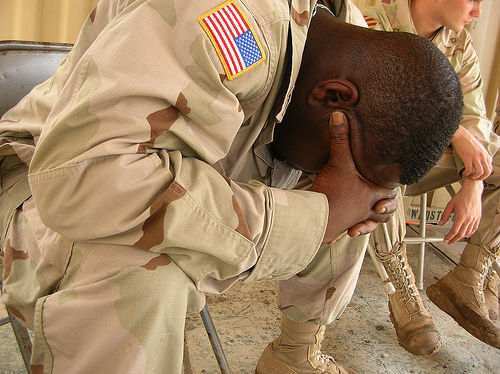After nearly a decade of war, PTSD is afflicting the U.S. military

While the Afghanistan and Iraq wars have cost the United States over $1 trillion, 5,000 deaths, and 30,000 maimings, there is yet another painful cost that is rarely discussed by the American public.
Post-traumatic stress disorder (PTSD) is plaguing both active and retired members of the Armed Forces. Multiple, repeated deployments to intense war theaters are taking a serious psychological toll on soldiers (and their families), and the statistical trend continues to worsen.
Just last week, I received a thoughtful email from Chad Cavanaugh, a veteran of the US Army Infantry, who served as a Sentinel at the Tomb of the Unknown Soldier. Mr. Cavanaugh, who was kind enough to allow me to use his name, wrote that he wanted to see a decompression program for retiring soldiers, a sort of psychological "basic training" to enable them to make the difficult transition to civilian life.
In addition, he believes that psychologically compromised veterans who have committed crimes should be placed in rehabilitation centers, instead of wasting away in federal prisons where they will never receive the treatment they so desperately need and deserve.
He pointed to the unfortunate story of California Marine, Nathan Damigo, whose PTSD almost certainly contributed to his criminal actions which sent him to prison recently. While not excusing Mr. Damigo's gun-related crime, Cavanaugh believed his psychological ailments had served as a catalyst for the breakdown.
The following statistics* appear to justify Mr. Cavanaugh's grave concerns over the debilitating effects of PTSD in a battle-weary military:
"More than 2 million men and women have been deployed to serve in both conflicts, and more than 40 percent of them have served at least two tours, according to military records...Nearly 300,000 troops have served three, four or more times. And, records show, more than half of those currently at war are at least on their second tour..."
"...the number of Iraq and Afghanistan veterans who are being treated as PTSD patients by the VA has increased from 134,000 in June last year to 143,530 reported in January this year..."
"...the number of Iraq and Afghanistan veterans' claims against the VA that were approved for PTSD claims increased from 59,000 in June last year to 67,052 reported in November..."
"VCS has estimated that the country may see a total of one million patients from the two wars at a total price tag of $1 trillion and rising."
"A 2009 report of Army troops in Afghanistan found that the rate of psychological problems rose significantly with the number of deployments: 31 percent for three tours, more than double the rate of those with just one. In Iraq, the survey found that nearly 15 percent of Army troops who served two tours suffered from depression, anxiety or traumatic stress, more than double that of a single tour. When it came to PTSD alone, the rate was 2.5 times higher for two deployments compared with one."
"Psychiatrists estimate that one in three US soldiers who served in Iraq or Afghanistan may develop Post Traumatic Stress Disorder (PTSD)."
"A study by the RAND Corporation revealed that 20% of veterans from Iraq and Afghanistan will suffer from PTSD or severe depression; sadly, only about 50% of these veterans will get the treatment they need."
These grim statistics reveal the damaging psychological toll of open-ended, overseas wars. But, they don't even reveal the full extent of the damage.
Many of these soldiers succumb to alcoholism, drug addiction, crime, and domestic violence when they return home to civilian life. Suicide rates (which I will cover in my next installment) are at record highs.
And while the VA is receiving more funding, and the Pentagon and scientific community are working hard to develop better neurological and psychiatric treatment methods, the reality is that the rising number of patients is overwhelming the system.
In the best case scenario, more advanced and more effective scientific methodology will continue to be developed to treat the physical and psychiatric symptoms of PTSD, maybe even to predict it in certain individual profiles, but the root cause of the problem will remain.
As long as our troops are repeatedly deployed to dangerous, high-intensity, open-ended wars in foreign nations, conditions will always be ripe for a persistent and pervasive PTSD dilemma.
* The sources for these statistics can be found here, here, and here.





